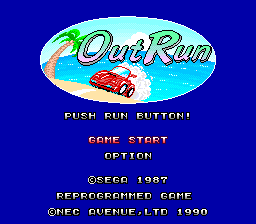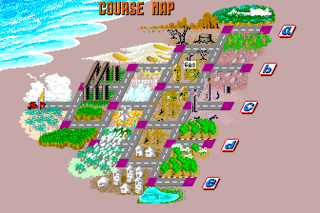OutRun
From NEC Retro
(Redirected from Out Run)
| OutRun | ||||||||||
|---|---|---|---|---|---|---|---|---|---|---|
| System(s): PC Engine | ||||||||||
| Publisher: NEC Avenue | ||||||||||
| Developer: NEC Avenue | ||||||||||
| Licensor: Sega | ||||||||||
| Developer(s) of original games: Studio 128 | ||||||||||
| Original system(s): Arcade (Sega OutRun hardware) | ||||||||||
| Peripherals supported: XE-1AP | ||||||||||
| Genre: Racing | ||||||||||
| Number of players: 1 | ||||||||||
| ||||||||||
|
OutRun (アウトラン) is an arcade game developed by Studio 128 in 1986 for specially designed hardware. It was designed by Yu Suzuki, and is often considered a milestone in the driving/racing genre, being ported to numerous home platforms and inspiring several sequels, including a port to the PC Engine by NEC Avenue in 1990.
Contents
Gameplay
The goal of OutRun is to simply drive a sports car to one of the five goals, labelled "a" to "e", without running out of time. Ⅰ accelerates the car, Ⅱ serves as the brake, and ← and → moves it left and right on the road. Due to limitations in the technology, it is impossible to fully turn the car around, nor is it possible to reverse.
Crashing into either other cars or scenery does not cause the player to lose lives, just time. After an area is cleared, checkpoints will allow the player to increase their time, and there will also be the option to select the next area through the form of a fork in the road. From a technical standpoint, every area is exactly the same length, though twists and turns can alter the amount of time needed to complete them. There are five possible endings, each with their own closing cinematic.
The car has two gears, high and low, which can be switched using ↓ and ↑. When in the high gear, the car becomes harder to control, however the top speed of the vehicle is increased. To be successful in OutRun the player needs to switch between gears at the appropriate moments, e.g. switching to the lower gear while negotiating tricky roads, or if the player has just crashed.
The number of lanes of traffic also differs between stages. Although there is never a situation in OutRun where the cars travel in the opposite direction to the player, the introductory level for example has six lanes of traffic.
Course layout
The stage order in the PC Engine version is based on the stage order from overseas releases of the game:
| Stage Number | Goal name | ||||
|---|---|---|---|---|---|
| 1 | 2 | 3 | 4 | 5 | |
| Vine Yard | A | ||||
| Wilderness | |||||
| Desert | Death Valley | B | |||
| Big Gate | Old Capital | ||||
| Coconuts Beach | Alps | Stone Hill | C | ||
| Walls | Wheat Field | ||||
| Cloudy Mountain | Dual Way | D | |||
| Seaside Tower | |||||
| Lake Side | E | ||||
Production credits
Magazine articles
- Main article: OutRun/Magazine articles.
Physical scans
| PC Engine, JP |
|---|
Technical information
ROM dump status
| System | Hash | Size | Build Date | Source | Comments | |||||||||
|---|---|---|---|---|---|---|---|---|---|---|---|---|---|---|
| ? |
|
512kB | Card (JP) |
References
Sega Retro has more information related to OutRun
|
| OutRun | |
|---|---|
|
Main page | Comparisons | Magazine articles | Reception
| |





